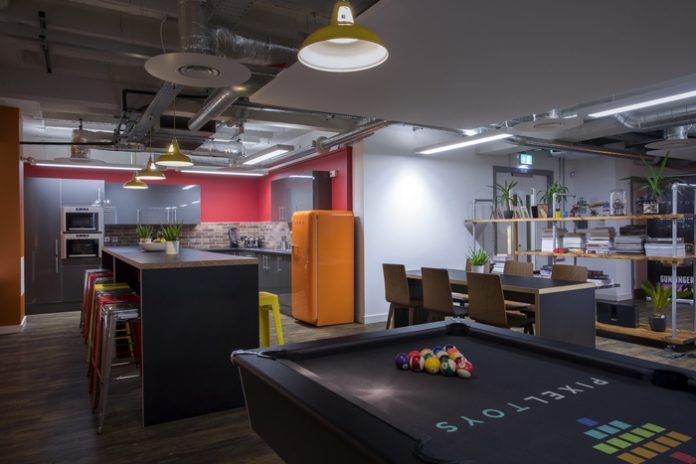
By Richard Williams, Associate, Office Agency & Tenant Representation, Knight Frank:
The advent of new technology has revolutionised the way we work and live. This dramatic transformation has destroyed the 9-5 office culture, creating endless possibilities and, if we are not careful, endless pressure. Whilst enhanced communication 24/7 can make our lives easier, we can equally fall prey to the “digital leash”, a leash which ties us permanently to our job.
Some enlightened firms are already putting measures in place to ensure that their employees can escape this treadmill. No emails out of working hours or on holiday; no staying at the office outside normal hours, unless absolutely necessary; no video-conferencing outside 9-5; and work-sharing, ensuring employees have a healthy and productive work-life balance.
These measures are eminently sensible as the perils of digital burn-out are all too evident and destructive. Stress takes a tremendous toll – at work (where too much pressure hampers productivity and sensible decision making) and at home (where family life takes a hammering if one or both parents cannot switch off from work). The digital revolution is a double-edged sword.
How many times do we bring a laptop home and work on Saturdays and Sundays, instead of playing with the children, lunching with friends, watching a film or going for a walk? How many times do we switch off from our partners in the evenings, because we just need to “finish this crucial report”? In the “old days”, before the arrival of laptops and smart phones, wouldn’t we have finished that report in the office the next day? We forget, far too often, that we need proper downtime – for ourselves, our family and our friends.
The blurring of the lines between work and life is well illustrated by a new generation of “digital nomads”, who have no office or who work from a bedroom at home. Just visit some of the bars and coffee shops in Birmingham and you will see these nomads at work. Their virtual offices have no or very limited overheads and technology enables them to work where they want, when they want. It’s tempting to envy them – especially if they know when to switch off. But if they can’t escape that digital leash, they will find themselves on an unforgiving treadmill.
If you aren’t a “nomad”, but work in an office instead, it is reassuring to learn that the more enlightened employers, especially cutting-edge digital firms, are creating space which is exciting, different and fun, thereby making the workplace stimulating and productive and, at the same time, clearly differentiating it from home. That puts the work-life balance into sharper perspective.
Creating a vibrant and engaging office space can and should reflect a company’s culture. It can give a sense of pride and worth for existing employees and serve as an attractive selling point to prospective new recruits. Depending on how you design the workplace, it can offer a host of benefits. Breakout areas offering light entertainment/amusement in a comfortable social environment gives employees a chance to decompress and not focus on work for a little while. In the same token, colourful, stimulating meeting spaces and interesting structures can inspire and help stir up employees’ creative juices.
We have clients in Birmingham who are actively considering installing music rooms, some are considering allowing employees to bring pets to work, and some are installing pool tables, table football and pinball machines etc. Humans are a social breed of animal and we need places to meet for collaboration and connections with clients and colleagues, these places are growing increasingly similar in look, feel and atmosphere to that of our homes, the places that we ‘live’.
Whilst not exclusive to this sector, this new wave of offices is most commonly associated with creative TMT sector businesses. Why? It’s a part of the industry’s fundamental culture, and, given the intensity around recruitment as in many industries, tech-based and other creative companies have been forced to evolve and compete by using their office space as a spearhead in the war for talent. The image above provides a sneak peek at the office fit-out of video game developers Pixel Toys within their new head office at Regent Square House in Leamington Spa. This shift in working culture and environment is happening in Birmingham, as it is elsewhere across the region; and all types of businesses right across the commercial spectrum are now catching on.
Our future offices must break the mould of the past two decades. If organisations want to attract the best and keep their workforce, they need to create spaces that the working population and emerging generation want to work in.
It would be unwise to claim that a stimulating working environment will loosen the “digital leash” at a stroke, but it should help to increase productivity which in turn should give us all more of a fighting chance of reinstating some important boundaries. Ultimately, of course, it is down to each and every one of us make sure that we achieve a satisfactory work-life balance in this pressurised hi-tech era.
Productivity in the workplace is key to supporting a firm’s balance sheet, that is why we are all in the jobs we are in, doing our bit to make a difference and this isn’t going to change. The way in which businesses are nurturing success however is changing and changing fast. Diverse, flexible and stimulating workplaces are going to be at the forefront.




















